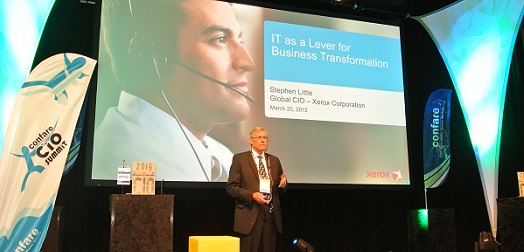By Stephen Little

(Editor’s Note: Stephen reviews some of the major points that he made during a keynote address to the 8th Confare CIO SUMMIT on March 25 in Vienna.)
I’ve experienced and led many shifts in the evolution of information technology over the last 40 years. From data processing with punch cards to sophisticated code; network email to mobile and social applications; on premise Enterprise Resource Planning to cloud based solutions. The list goes on.
Managing change isn’t new for chief information officers.
We are immersed in day-to-day decisions that keep the business running securely and smoothly. We’re also involved in complex, global transformation initiatives. As technology evolves, consumers and employees discover new ways of working more efficiently.
My job is much more than installing the latest technological solutions; it’s about integrated, strategic partnerships, and planning that removes complexity and simplifies business operations. This includes taking a pragmatic approach to identifying and retiring legacy systems and applications that hinder our ability to take advantage of new technological advancements.
Business Partners, not Order-Takers
I see the role of the CIO as a lever for business transformation. CIOs and the people who work for us aren’t just technologists, we’re business leaders.
Years ago, it was fair to view the IT department as order-takers. Need some technology? Pick up the phone, order it, and we’ll install it. But business has changed – the world has changed. If all you do today is install technology and walk away, then you should not be surprised if you miss on goals like employee productivity, enhanced customer experiences or improved business processes. Yes, technology advances progress, but it must be the right technology that is implemented sensibly.
True transformation requires partnerships all over the company – up, down and across every organization. Today, CIOs touch customer’s from every industry, and work with leaders and teams everywhere, including our partners and vendors. Our IT teams must understand the challenges colleagues and customers face, and grasp the market pressures that impact profit and loss decision making. We are expected to recommend technology solutions that will allow our business to succeed and grow.
Pizza Parlors Versus Dietitians
Here’s an analogy I like to use. Employees in the IT department of years past were like pizza order-takers who filled their customers bellies — not a bad thing, in fact, quite useful in its own way. Today, the desired state is to be more like dietitians who collaborate with you to make good decisions, execute appropriate changes, and deliver positive outcomes.
This journey from order-taker to trusted business partner means that our people must engage in conversations that get to the root of the problem, and reveal viable solutions. This is nothing less than a culture change – not only for our people, but for the rest of the company.
It’s important to avoid making promises to requests that cannot be delivered. We use that moment to shape and influence the conversation into something that makes sense for the business overall, and we have that conversation in terms that everyone understands.
But one point is simple: Effective business transformation happens when the IT organizations are fully engaged and seen as part of “the business.”



